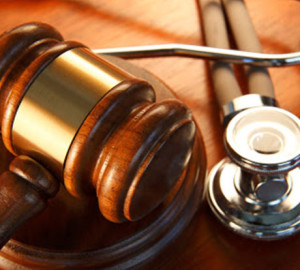 Medical malpractice can occur in many ways. On occasion, the health care provider’s negligence will actively cause an injury. For example, operating on the wrong arm or leg, inadvertently cut the common bile duct during gall bladder removal surgery, or leave a gauze or surgical instrument in a patient’s body. But the majority of malpractice claims involve the failure of the health care provider to prevent the occurrence or development of an injury or disease.
Medical malpractice can occur in many ways. On occasion, the health care provider’s negligence will actively cause an injury. For example, operating on the wrong arm or leg, inadvertently cut the common bile duct during gall bladder removal surgery, or leave a gauze or surgical instrument in a patient’s body. But the majority of malpractice claims involve the failure of the health care provider to prevent the occurrence or development of an injury or disease.The most common claim is a failure to timely diagnose and treat an illness or a complication. One common example is the failure of health care providers to appreciate the signs and symptoms of sepsis — systemic infection — and start timely treatment. Sepsis protocols have been developed over the past 15 years to ensure this does not occur. However, a number of hospitals have failed to adopt those protocols. A larger number have purportedly adopted them, but fail to educate their nursing staff adequately and fail to ensure that the protocols are followed. That can, and unfortunately often does, result in catastrophic injury, such as loss of limbs, organ damage, or brain damage, and ultimately death. Another common failure to diagnose case involves a failure to diagnose cancer when the disease could have been successfully treated. Laboratories occasionally misinterpret biologic specimens, leading to a delay in life-sparing care. Similarly, radiologists sometimes hurriedly miss lesions that are apparent on x-ray or other films, delaying necessary treatment.
There are a variety of other medical negligence situations that can occur. Patients who are at risk of falling are sometimes left unattended in hospital or nursing home beds with the rails not extended. Elderly or disabled patients are not turned with sufficient frequency to prevent the development of decubitus ulcers – bedsores – that when infected can lead to death.
We have a great deal of experience in handling suits in all of these medical negligence situations and are currently considering new cases involving same. Unfortunately, though, pursuing these matters can be very expensive, and the expenses incurred cannot be recovered. Accordingly, unless there has been a significant injury or death, it often is not economic from the client’s perspective to pursue these claims. Of course, whether an injury is “significant” is purely subjective, and it is not possible to generate a list of injuries that would justify the cost of pursuing a medical malpractice lawsuit.
If a family member has died as a result of medical negligence, or if you believe you or a family member has suffered a significant injury as a result of medical misadventure, the best thing to do is to submit the form on this website for a prompt, no-cost review.
If you would prefer, you can call our Seattle office on 206-488-9336 to discuss your case.